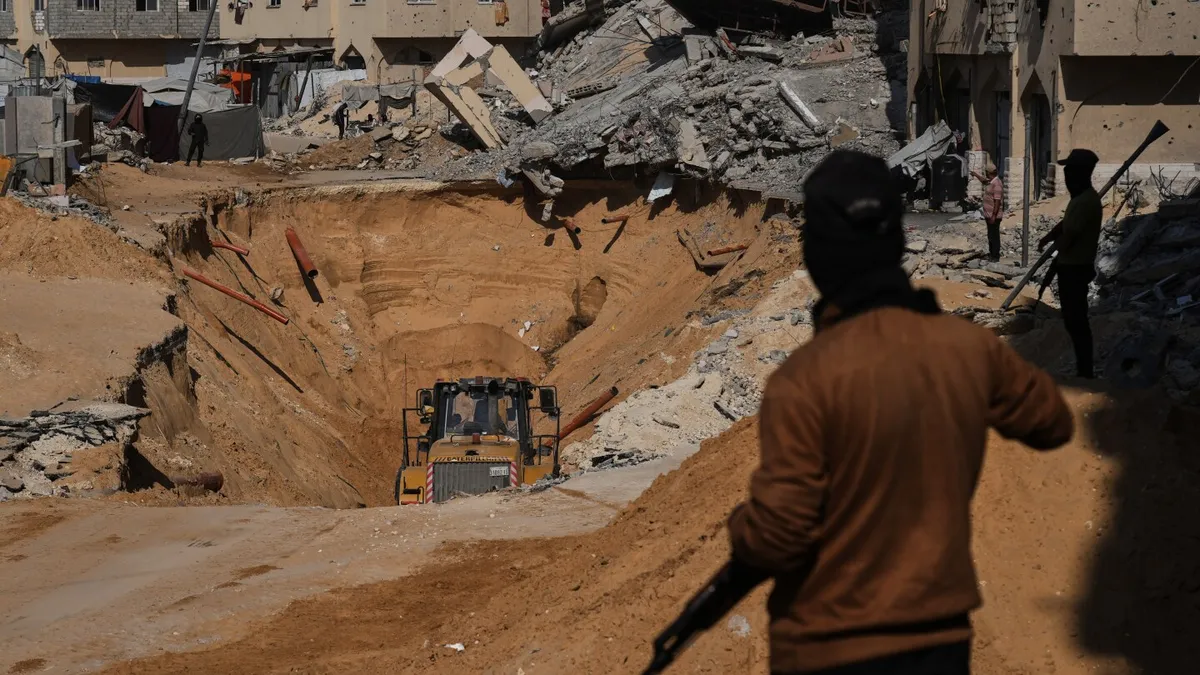
TEL AVIV, Israel (AP) — On Sunday morning, Israel confirmed the identification of the remains of two hostages following a handover by Hamas to the Red Cross. This transfer occurred on the previous night, as discussions for the second phase of ceasefire negotiations were reportedly underway. The remains belonged to Ronen Engel, a father of three from Kibbutz Nir Oz, and Sonthaya Oakkharasri, a Thai agricultural worker who was killed in Kibbutz Be’eri. Both hostages were believed to have been killed during the violent attack on October 7, and their bodies were subsequently taken to Gaza.
Engel's family has been deeply affected by the conflict; his wife, Karina Engel, along with two of their children, were kidnapped but released during a previous ceasefire in November 2023. As the situation unfolds, Israeli authorities have issued a warning, stating they will keep the Rafah border crossing between Gaza and Egypt closed “until further notice.” According to a statement from Prime Minister Benjamin Netanyahu’s office, the reopening of Rafah will hinge on Hamas's commitment to return the remains of all 28 deceased hostages.
To date, Hamas has handed over the remains of 13 bodies, with 12 confirmed as hostages. However, Israeli authorities noted that one of the bodies released did not belong to a hostage. The handover process, alongside aid deliveries to Gaza and discussions about the future governance of the war-torn territory, are critical elements of the ceasefire agreement reached on October 10, aimed at ending two years of conflict.
The Rafah border crossing, prior to the war, was the only entry point not controlled by Israel. It has remained closed since May 2024, when Israel assumed control of the Gaza side. A fully reopened crossing would facilitate easier access for Palestinians seeking medical treatment, travel, or family visits in Egypt, which is home to tens of thousands of Palestinians. On Sunday, the Palestinian Authority’s Interior Ministry in Ramallah outlined procedures for Palestinians wishing to cross the Rafah border. Those looking to exit Gaza can obtain temporary travel documents from Palestinian Embassy staff present at the crossing, while entry into Gaza will require relevant documents obtained from the embassy in Cairo.
According to the Hamas-run Health Ministry, Israel's military actions in Gaza have resulted in over 68,000 Palestinian deaths. These figures are regarded as reliable estimates of wartime fatalities by U.N. agencies and many independent observers, though Israel disputes these numbers without providing an alternative count. Furthermore, thousands are reported missing, as indicated by the Red Cross. The initial attack by Hamas-led militants on October 7 claimed approximately 1,200 lives, predominantly among civilians, and involved the abduction of 251 individuals.
As ceasefire negotiations progress, the Israeli military reported that militants targeted troops in the southern Gaza city of Rafah, near areas controlled by Israel, though no injuries were reported. A senior Hamas official denied any involvement in the incident. Both Hamas and Israel have traded accusations regarding violations of the fragile ceasefire. In a recent development, Hamas announced that discussions with mediators for the second phase of the ceasefire, introduced by U.S. President Donald Trump, have commenced. Hamas spokesman Hazem Kassem stated that this phase requires national consensus and indicated that Hamas is working to solidify its positions without providing further details.
According to Trump’s plan, upcoming negotiations will focus on disarming Hamas and establishing an internationally recognized authority to govern the embattled Gaza Strip. Kassem emphasized that Hamas will not participate in this ruling authority, asserting that existing Hamas-run government bodies in Gaza will continue to manage daily affairs to prevent a power vacuum. He called for the formation of a Community Support Committee, composed of Palestinian technocrats, to oversee day-to-day governance until a broader administrative committee is formed and agreed upon by all Palestinian factions.
In a recent statement, Hamas dismissed allegations made by the U.S. State Department, which claimed to have credible reports of an imminent planned attack by Hamas against Gaza residents. The State Department characterized such an attack as a severe violation of the ceasefire agreement, potentially undermining progress achieved through diplomatic efforts. In response, Hamas labeled these claims as “false allegations” and accused Israel of supporting armed groups operating in Israeli-controlled areas.
Hamas has engaged in confrontations with at least two armed groups in eastern Gaza City, which they allege are involved in looting humanitarian aid and collaborating with Israel. Public executions of suspects have drawn widespread condemnation. The Hamas-run Interior Ministry stated that its forces are actively working to restore law and order in regions vacated by Israeli military forces in the aftermath of the ceasefire.